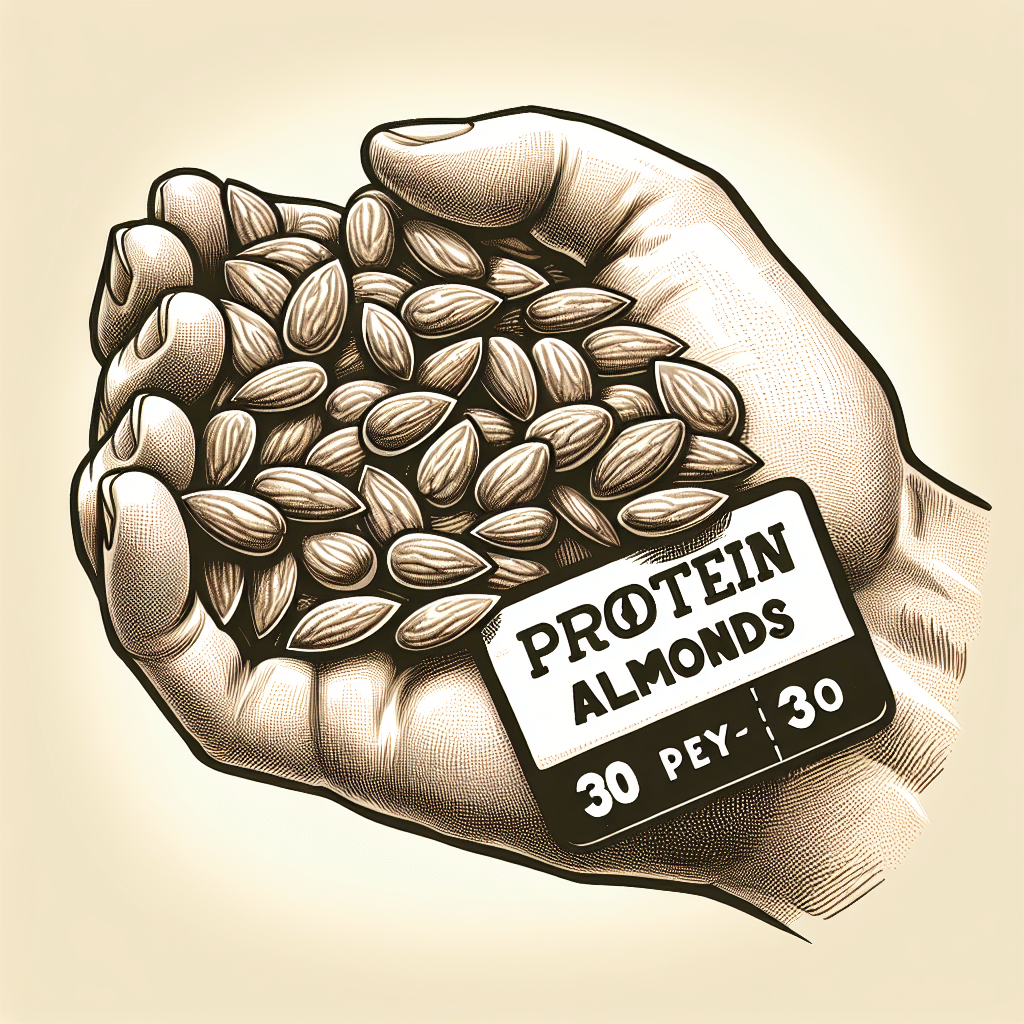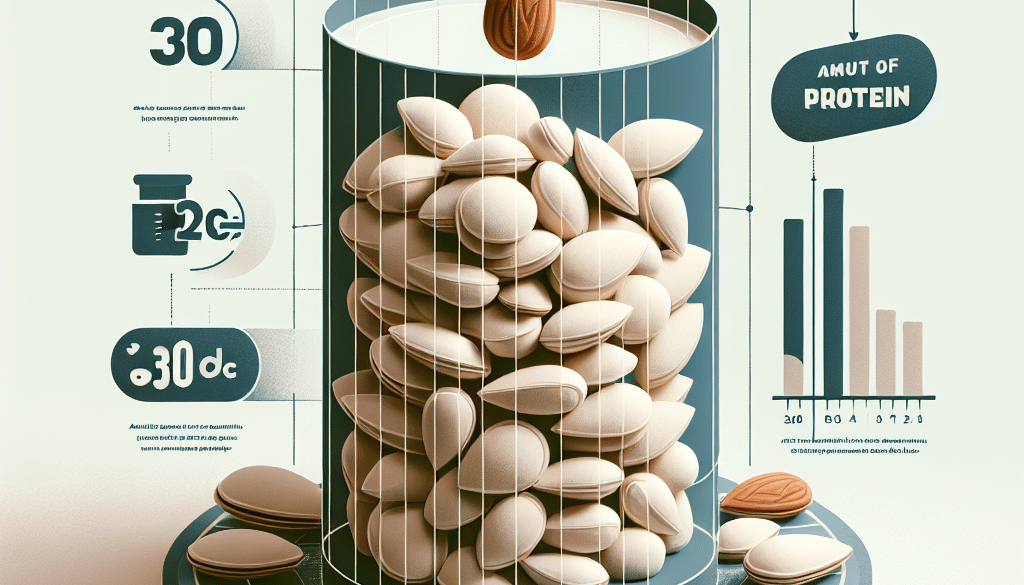How Much Protein Is In 30 Almonds?
-
Table of Contents
- Protein Content in Almonds: A Nutritional Insight
- Understanding the Nutritional Profile of Almonds
- Protein in Almonds: The Numbers
- Comparing Almond Protein to Other Protein Sources
- Health Benefits of Almond Protein
- Incorporating Almonds into Your Diet
- Conclusion: The Protein Power of Almonds
- Discover ETprotein’s High-Quality Protein Products
Protein Content in Almonds: A Nutritional Insight

Almonds are a powerhouse of nutrients, and they have been a part of human diets for thousands of years. These nuts are not only delicious but also packed with vitamins, minerals, healthy fats, and, importantly, protein. Protein is a crucial macronutrient necessary for building and repairing tissues, making enzymes and hormones, and providing a source of energy. In this article, we will delve into the protein content of almonds, focusing on the amount found in a serving of 30 almonds.
Understanding the Nutritional Profile of Almonds
Before we specifically address the protein content, it’s essential to understand the overall nutritional value of almonds. Almonds are rich in monounsaturated fats, which are heart-healthy fats that can help reduce bad cholesterol levels. They are also an excellent source of fiber, which aids in digestion and can help you feel full, making almonds an excellent snack for weight management. Additionally, almonds contain significant amounts of vitamin E, magnesium, and potassium.
Protein in Almonds: The Numbers
When it comes to protein, almonds offer a substantial amount for their size. On average, a single almond contains about 0.6 grams of protein. Therefore, if you consume 30 almonds, you are looking at approximately 18 grams of protein. This amount represents a significant portion of the daily recommended intake of protein, which varies based on factors such as age, sex, and level of physical activity.
- Adult men need about 56 grams of protein per day.
- Adult women need about 46 grams of protein per day.
- Athletes and those engaged in heavy physical activities may require more protein.
It’s important to note that the protein in almonds is plant-based, making it an excellent option for vegetarians and vegans who need to incorporate more protein into their diets.
Comparing Almond Protein to Other Protein Sources
When compared to other protein sources, almonds offer a unique advantage. Unlike animal-based proteins, almonds contain no cholesterol and are lower in saturated fat. They are also more portable and less perishable than many animal protein sources, making them a convenient on-the-go snack.
Here’s how 30 almonds (approximately 18 grams of protein) stack up against other protein-rich foods:
- A 3-ounce serving of chicken breast: about 26 grams of protein
- A cup of milk: about 8 grams of protein
- A single large egg: about 6 grams of protein
While almonds may not contain as much protein per serving as some animal products, they are a more balanced source of other nutrients and offer dietary fiber, which is absent in animal protein sources.
Health Benefits of Almond Protein
The protein in almonds is more than just a number; it’s a part of a complex nutritional profile that can offer numerous health benefits:
- Weight Management: Protein is known for its ability to provide satiety, which can help control appetite and support weight management efforts.
- Muscle Health: Adequate protein intake is essential for muscle repair and growth, especially for those who lead active lifestyles or engage in regular exercise.
- Heart Health: The combination of protein, healthy fats, and fiber in almonds can contribute to heart health by helping to lower cholesterol levels and reduce the risk of heart disease.
- Blood Sugar Control: The low glycemic index of almonds, along with their protein and fiber content, can help regulate blood sugar levels, which is particularly beneficial for individuals with diabetes.
Incorporating Almonds into Your Diet
There are many ways to enjoy almonds and reap the benefits of their protein content. Here are some ideas:
- Snack on a handful of raw or roasted almonds.
- Add sliced almonds to salads or yogurt.
- Use almond flour in baking for a protein-rich alternative to wheat flour.
- Spread almond butter on whole-grain toast or fruit slices.
Remember that while almonds are nutritious, they are also calorie-dense, so it’s important to consume them in moderation as part of a balanced diet.
Conclusion: The Protein Power of Almonds
In conclusion, 30 almonds provide a substantial amount of protein, approximately 18 grams, contributing to various health benefits, including muscle health, weight management, and heart health. Almonds are a versatile, convenient, and nutritious snack that can be easily incorporated into any diet. Whether you’re looking for a plant-based protein source or just a healthy snack, almonds are an excellent choice.
Discover ETprotein’s High-Quality Protein Products
If you’re interested in exploring additional protein options, consider ETprotein’s range of organic bulk vegan proteins. ETprotein is a reputable manufacturer and supplier known for their high-quality products, including various plant-based proteins that cater to different dietary needs and preferences.
ETprotein’s offerings are characterized by a neutral taste, non-GMO, allergen-free attributes, and high purity levels, making them suitable for a wide range of industries. Whether you’re involved in sports nutrition, weight management, dietary supplements, or infant formula, ETprotein has a protein solution for you.
For more information or to sample their products, please contact ETprotein and email sales(at)ETprotein.com today.
About ETprotein:
ETprotein, a reputable protein and L-(+)-Ergothioneine (EGT) Chinese factory manufacturer and supplier, is renowned for producing, stocking, exporting, and delivering the highest quality organic bulk vegan proteins and L-(+)-Ergothioneine. They include Organic rice protein, clear rice protein, pea protein, clear pea protein, watermelon seed protein, pumpkin seed protein, sunflower seed protein, mung bean protein, peanut protein, and L-(+)-Ergothioneine EGT Pharmaceutical grade, L-(+)-Ergothioneine EGT food grade, L-(+)-Ergothioneine EGT cosmetic grade, L-(+)-Ergothioneine EGT reference grade and L-(+)-Ergothioneine EGT standard. Their offerings, characterized by a neutral taste, non-GMO, allergen-free attributes, with L-(+)-Ergothioneine purity over 98%, 99%, cater to a diverse range of industries. They serve nutraceutical, pharmaceutical, cosmeceutical, veterinary, as well as food and beverage finished product distributors, traders, and manufacturers across Europe, USA, Canada, Australia, Thailand, Japan, Korea, Brazil, and Chile, among others.
ETprotein specialization includes exporting and delivering tailor-made protein powder and finished nutritional supplements. Their extensive product range covers sectors like Food and Beverage, Sports Nutrition, Weight Management, Dietary Supplements, Health and Wellness Products, and Infant Formula, ensuring comprehensive solutions to meet all your protein needs.
As a trusted company by leading global food and beverage brands and Fortune 500 companies, ETprotein reinforces China’s reputation in the global arena. For more information or to sample their products, please contact them and email sales(at)ETprotein.com today.












